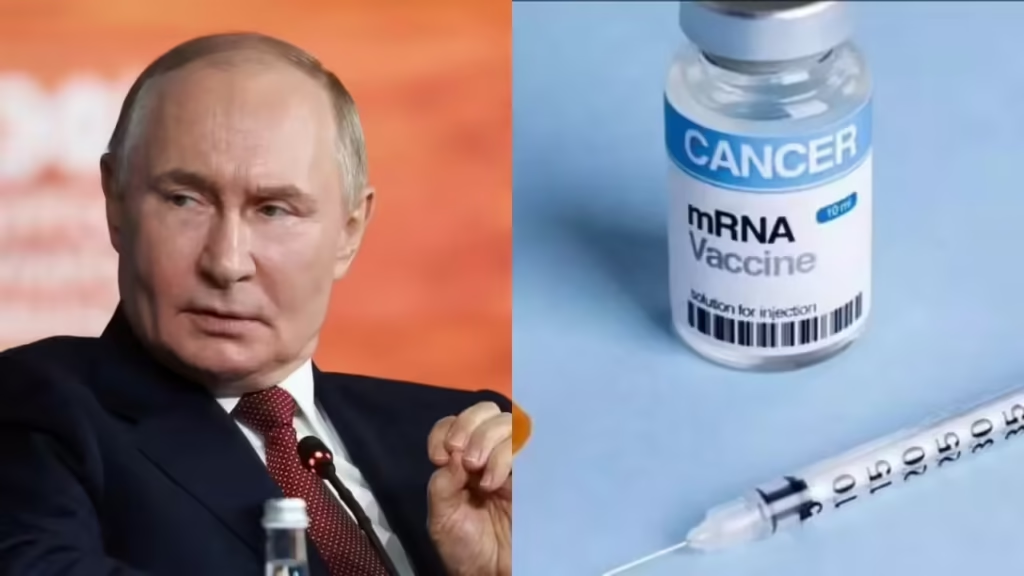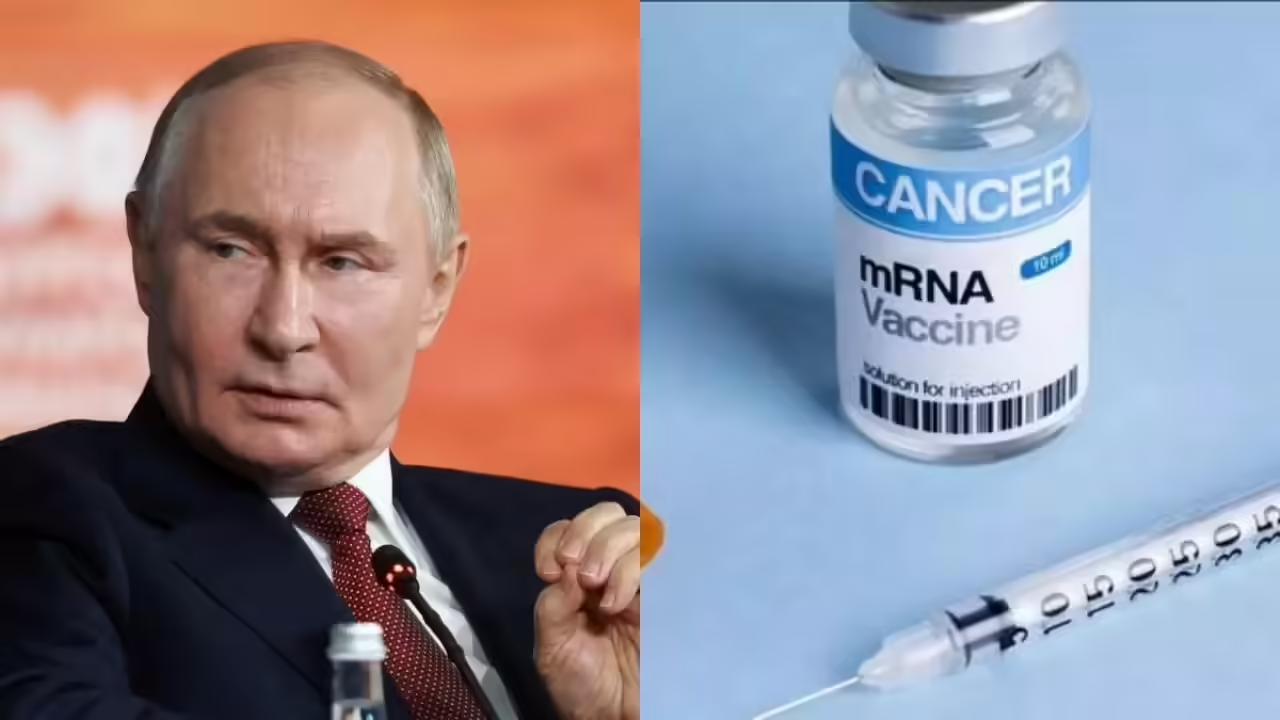In a development being hailed as a defining moment in medical history, Russia has announced the successful creation of the world’s first mRNA-based cancer vaccine, Enteromix. According to officials, the experimental vaccine demonstrated 100% efficacy and safety across clinical trials, raising hopes that one of humanity’s deadliest diseases could soon become treatable without the toxic side effects of chemotherapy or radiation.
The announcement, made by the Ministry of Health in Moscow on Monday, revealed that Enteromix has already begun limited clinical use in select oncology centers while awaiting final approval for mass rollout. Developed jointly by the National Medical Research Radiological Centre (NMRRC) and the Engelhardt Institute of Molecular Biology under the Russian Academy of Sciences, the vaccine applies cutting-edge messenger RNA (mRNA) technology to train the immune system to recognize and destroy cancer cells.
If confirmed in wider studies and subsequent international evaluations, the vaccine could mark the most significant breakthrough in cancer research in decades, reshaping healthcare systems and extending survival for millions of patients worldwide.
How Enteromix Works
Enteromix relies on a principle similar to that of existing mRNA COVID-19 vaccines, which revolutionized pandemic responses in 2020. Instead of delivering viral proteins, the vaccine instructs human cells to produce a specific antigen present only on cancerous cells. By generating these molecular “red flags,” the body’s immune system learns to target malignant growths with precision while leaving healthy tissue untouched.
Unlike chemotherapy, which indiscriminately attacks rapidly dividing cells causing hair loss, nausea, and immune suppression, Enteromix demonstrated no serious side effects during trials. Patients reported only mild injection-site reactions and short-lived fatigue, according to trial officials.
“This is not about temporary remission,” said Dr. Irina Petrova, leading immunologist at NMRRC. “With Enteromix, we are teaching the immune system to recognize cancer as a foreign invader and eliminate it entirely. In our trials, every patient achieved complete remission.”

Clinical Trials and Results
The multi-phase clinical trial program included more than 540 patients across Russia suffering from various cancers—lung, breast, colorectal, pancreatic, and hereditary cancers. Trials also included patients resistant to standard therapies such as platinum-based chemotherapy.
According to the published data, all participants responded positively, achieving either partial or complete remission within six months of vaccination. At the 18-month follow-up, none of the patients showed relapse.
Notably, Enteromix was administered via a standard intramuscular injection, requiring only two doses spaced four weeks apart. For patients with advanced-stage disease, an optional booster was given at the six-month mark.
The reported efficacy rate of 100% stunned not only Russian oncologists but also international observers. Most cancer immunotherapies to date, including CAR-T cell therapy and checkpoint inhibitors, demonstrate response rates under 50%.
“This is nothing short of a paradigm shift,” said Prof. Sergei Kulikov, head of oncology at Moscow State University. “For years we believed cancer was too complex and genetically diverse for a single universal immunotherapy. Enteromix challenges that assumption.”
Early Clinical Use and Global Interest
While awaiting market authorization from Russia’s regulatory body Roszdravnadzor, the Health Ministry confirmed that Enteromix has already been introduced in limited clinical use at five oncology centers across Moscow, St. Petersburg, and Novosibirsk.
Patients who had exhausted all other treatment options were among the first to receive post-trial vaccinations. Several case studies have already been documented. According to hospital officials, even individuals with aggressive pancreatic and small-cell lung cancers achieved full remission within months.
Global attention has been swift. Medical authorities in Germany, India, China, and Brazil requested access to peer-reviewed data. The World Health Organization (WHO) acknowledged the development on Tuesday, stating, “If independent reviews confirm these findings, Enteromix may represent the most important cancer breakthrough in a century.”
Economic and Geopolitical Implications
The global cancer treatment market, valued at over $180 billion annually, could be radically disrupted by the widespread adoption of Enteromix. Pharmaceutical giants heavily invested in chemotherapy drugs and immunotherapy agents are already watching closely.
Russia, still recovering from years of strained economic conditions and sanctions, could see Enteromix as both a scientific triumph and a powerful geopolitical tool. Analysts suggest the country is likely to seek joint ventures for international production but may also prioritize domestic access before large-scale export.
“This is not just a biomedical innovation, it is a soft-power moment for Russia,” said Dr. Elena Markovich, political analyst at the Russian International Affairs Council. “Delivering the first functional cure for cancer could shift the country’s global image from a military power to a humanitarian leader in healthcare.”
Patient Voices
In Moscow’s Blokhin Cancer Centre, 49-year-old Marina Ivanova battled metastatic breast cancer for four years before enrolling in the Enteromix trial. Her immune system had collapsed under multiple rounds of chemotherapy. Yet six months after receiving the vaccine, her latest scans showed no detectable tumors.
“I didn’t believe it at first,” Ivanova told reporters. “After everything I went through, I thought there was no hope left. But Enteromix gave me back my life. I am walking my daughter to school again.”
Similar accounts are surfacing online from trial participants, with patient advocacy groups cautiously celebrating what some are calling the “miracle vaccine.”
International Skepticism and Next Steps
Despite these glowing reports, some scientists outside Russia urge cautious optimism. Cancer’s genetic variability, they argue, makes universal treatments rare.
Dr. Michael Anders, oncology researcher at the University of Oxford, noted: “We need full peer-reviewed trial data to evaluate. Complete success in hundreds of patients, across multiple cancer types, without recurrence is extraordinary—and extraordinary claims require extraordinary evidence.”
According to Russian officials, full trial datasets will be submitted to The Lancet and Nature Medicine within the next month. Joint review studies with partners in Germany and India are already being scheduled.
If global regulators confirm the results, Enteromix could enter international markets as early as 2027, pending large-scale production capacity.
A Return of mRNA Technology
Enteromix underscores the long-term power of mRNA technology, first thrust into the spotlight during the COVID-19 pandemic. While COVID-19 vaccines targeted an infectious pathogen, scientists had long theorized that similar approaches could disrupt cancer, HIV, and autoimmune diseases.
“COVID vaccines gave us the delivery mechanism,” explained molecular biologist Dr. Alexei Smirnov, who helped lead the vaccine’s development. “What we did was reprogram that delivery system against the mutations that drive cancer. This is the fulfillment of decades of work.”
Looking Ahead
The Russian government has pledged to subsidize Enteromix domestically, ensuring free access for its citizens under the national health program. Officials estimate that within five years, all cancer patients in Russia will have access to the vaccine.
Globally, health economists predict that if licensed widely, Enteromix could save tens of millions of lives annually. According to WHO figures, cancer still kills nearly 10 million people each year—a toll that could plummet if the vaccine lives up to its promise.
“This is the dawn of a new era in oncology,” declared Health Minister Mikhail Murashko in his televised announcement. “Cancer has been mankind’s darkest enemy. With Enteromix, we now hold the key to defeating it.”
(With inputs from agencies)
